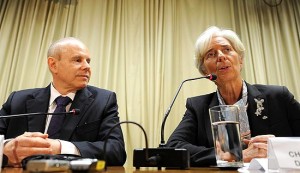Lagarde Meets with Rousseff and Mantega as Part of Her Visit to Latin America to Negotiate Brazil’s Lending to the IMF

For many years, Brazil was a constant borrower of the International Monetary Fund (IMF), but this time the country has been formally requested to lend funds to the IMF, which shows a remarkable shifting of power in the international scenario. With that in mind, Christine Lagarde held a meeting with Brazilian President Dilma Rousseff and her finance minister Guido Mantega as part of her first visit to Latin America as the IMF’s managing director.
Although the details of the lending proposal are still in negotiation, after the aforementioned meeting, Brazil has indicated that it would lend to the IMF on the condition that it restructures its quota system. The quotas have been denominated as Special Drawing Rights (SDRs), which is the IMF’s unit of account and affords the quota-holders voting power. Currently, Brazil accounts for 4,250.5 million SDRs, which represent 43,246 votes. Therefore, the country seeks to increase its influence with the previously mentioned quota restructuring initiative and take a more central role in the IMF’s decision-making process, a goal that is consistent with Rousseff’s aims to expand Brazil’s “great country” campaign to flex its influence in the global community.
According to Mantega, Brazil’s willingness to help is not only in response to the European crisis, but also with the destiny of the developing countries in mind: “I believe that the euro zone has the tools to overcome the crisis, but while it doesn’t happen, the situation is getting worse. Our concern is not only with the European countries, but mainly with the emerging countries.”
Brazil has shown itself to be a country not only wanting, but deserving of a greater role in the IMF, based on its strong economy as well as its high degree of foreign investment. To that effect, following her press conference with the country’s senior officials, Lagarde mentioned that “in the last few years, Brazil has also benefited from a solid and well-capitalized banking sector, which has so far softened the impact of one important channel of contagion from the global financial crisis,” which has served to reinforce Brazil’s progress and consolidation.
Despite Lagarde’s effort to raise the funding at stake, she also declared that if no collective measures are taken, there is a risk that the next 10 years will become a lost decade for Europe, which shows the magnitude and complexity of Europe’s issues.
Furthermore, before going to Brazil, Lagarde visited Mexico, which recently became the Chair of the G20. While visiting there, she met with President Felipe Calderón, Finance Minister José Antonio Meade, Central Bank Governor Agustín Carstens, as well as some of Mexico’s leading female executives. Among the many subjects discussed were the details of Mexico’s contributions to the Fund, but no solid measures were decided upon.
Lagarde’s visit to Latin America clearly shows the level of importance that many of the region’s countries have achieved within the international framework and is representative of a power shift in the international community. Thus, the improved financial standing of these countries could make them consistent possible sources of funding for future IMF initiatives.
Para leer este análisis en español, haga click aquí.

